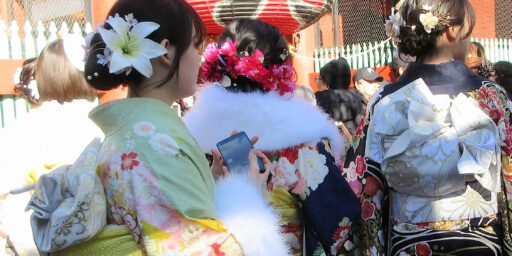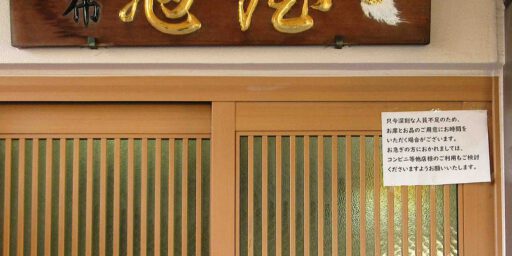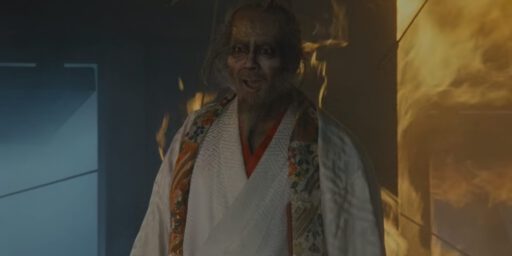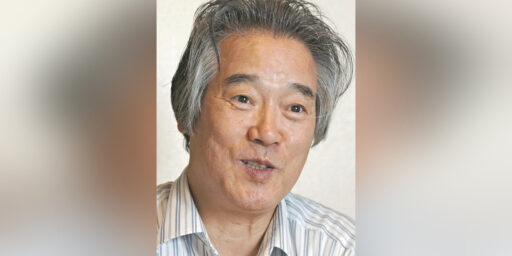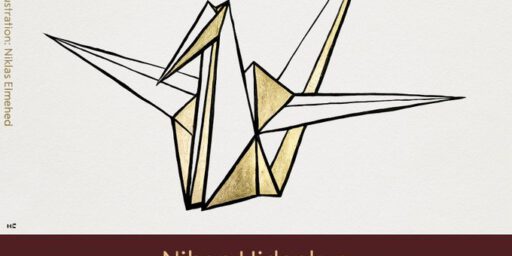2024年ノーベル平和賞に日本被団協 核兵器廃絶訴え Nobel Peace Prize 2024 awarded to the Japanese Organisation "Nihon Hidankyo", the Grassroots Movement of Atomic Bomb Survivors (HIBAKUSHA)
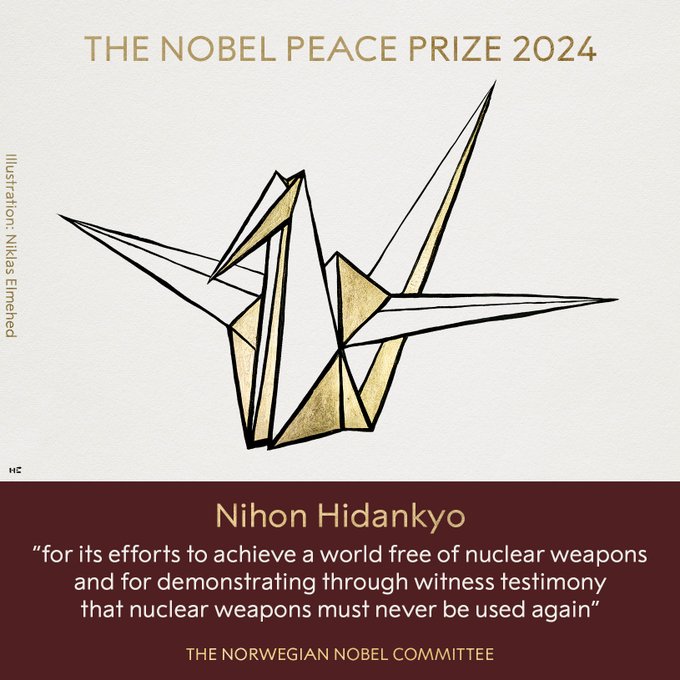
The Norwegian Nobel Committee has decided to award the 2024 Nobel Peace Prize to the Japanese organisation Nihon Hidankyo. This grassroots movement of atomic bomb survivors from Hiroshima and Nagasaki, also known as Hibakusha, is receiving the peace prize for its efforts to achieve a world free of nuclear weapons and for demonstrating through witness testimony that nuclear weapons must never be used again.
ことしのノーベル平和賞は、被爆者の立場から核兵器廃絶を訴えてきた日本被団協=日本原水爆被害者団体協議会が受賞することになりました。核兵器のない世界を実現するための努力と核兵器が二度と使用されてはならないことを証言によって示してきたことが受賞理由となっています。日本のノーベル平和賞受賞は、1974年の佐藤栄作元総理大臣以来、50年ぶりです。
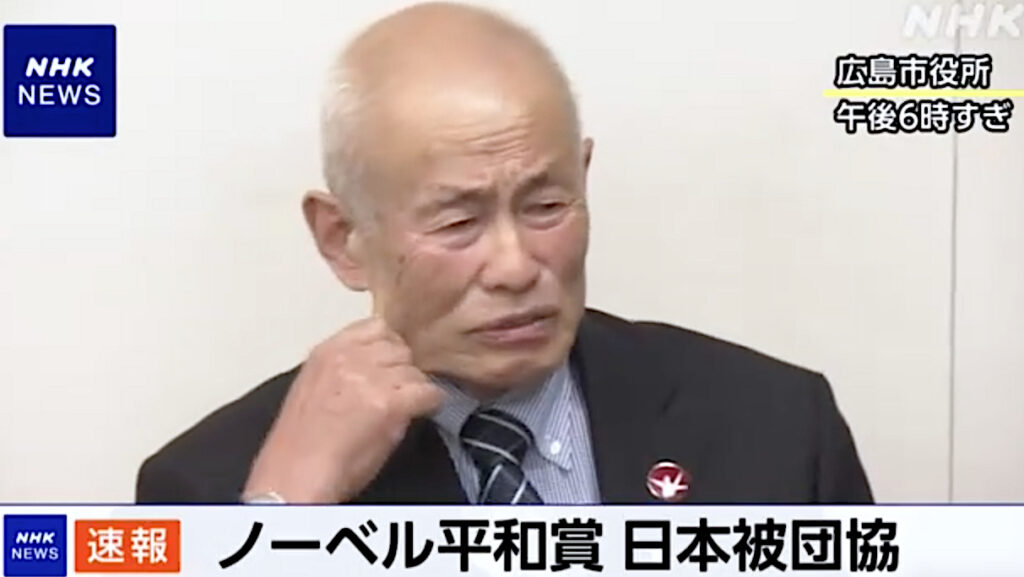
長崎の“被爆体験者”「私たちは被爆者ではないのか」 岸田総理「合理的に解決」発言も直後に退陣表明 “埋もれた被爆者”の救済は?今月9日 長崎地裁判決【news23】|TBS NEWS DIG
In case of interest, the actual Prime Minister of Japan ISHIBA Shigeru 石破 茂 is PRO Nuclear Weapons and PRO Nuclear Power Plants. ISHIBA of the Right Wing Party LDP 右翼自民党 is the REAL face of Japan’s society.
Via deepl.com or google translate, you can read the translations in your country’s language.
下記記事の赤太字部分、誰の言か!
2006年9月、毎日新聞・鳥取版の石破茂防衛庁長官談の一部である。言うまでもないが今の石破幹事長と同一人物、これといま彼がとっている行動とはどうつながるというのか!
==============================================
愛国心:どうなる日本-私の視点/11 声高に言う人間は信用しない /鳥取
2006.09.23 地方版/鳥取 23頁
◆衆議院議員・石破茂さん(49)
◇育てるのでなくあるもの--祝日には必ず国旗掲げる
男女の愛情と同じで、「愛国心」にも良い面も悪い面も正面から見据える理性と勇気が必要だろう。ただ、内面で密かに思うものなので、声高に言う人間は信用しない。教育基本法に定めても、日本が検定教科書である限り思想信条の自由を侵す心配は少ないが、かといって定めてどうなるものでもない。
そもそも、育てようとして育つものでなく、元々あるものだ。私は国民の祝日には必ず、門前に国旗を掲げる。我が家では、それが子どもの仕事だった。今では鳥取の自宅周辺でも少なく、国旗が風呂敷売り場で売られているのを知らない人も多いだろう。父はキャリアの行政官として戦地に赴き抑留されたが、国を否定する親の言葉を聞いたことがなかった。
世界規模のスポーツイベントで愛国心を感じる若い人が多いというが、あの熱狂ぶりを見て「ヒトラー・ユーゲント(ナチスの青少年組織)の再来か」と怖くなった。ああいう人は極右に走りやすくて、権力者にとって本当に利用しやすい。
教育の効果はすごい。防衛を専門にやるようになったのは、北朝鮮の現状を視察したのがきっかけだった。当時の指導者は金日成で、子どもから高齢者までが「素晴らしい!」と徹底的に教えられ、信じている。中国や韓国の歴史教育も見てほしい。愛国心を作るのは簡単だ。
だから、教育目的に愛国心を規定するのは難しい。かの国のようになりたくはないし、今のように自分の国を何となく嫌いになる教え方もよくない。さまざまな見方を教えて議論できる教育が望ましいが、国の良い面だけ教えることにつながりかねず、国家主義的な教育をされる危険性がある。
最近は、自民党内の若い議員を見ても、怖い。過去の戦争を「すべて正しかった」と考えていて、頭は大丈夫かと疑いたくなる。日中戦争は明らかに侵略戦争だし、韓国併合は植民地化で、自衛戦争の面がある太平洋戦争でも、インドネシアの人を日本人化しようとしたのは間違っていた。
なぜ戦争を始め、途中で止められず、負けたのか――。そこから目をそらし、責任の所在を不明瞭にするのは愛国心ではない。戦争を語ることがタブーとされてきた反動で、「戦争に負けた」と教わった昭和40年代前半までとそれ以降の世代の分水嶺が消え、社会が左から右に大きく振れている。
この2~3年、大っぴらにナショナリズムが叫ばれ、不快だ。国は戦中、言論統制により新聞など批判勢力を排除し、従わなければ「非国民」と斬り捨てた。なぜ同じことを繰り返すのか。そんなやり方では、国を誤っても幸せにすることはあり得ない。愛国心をあおって戦争し、負けたのが日本だ。【聞き手・松本杏】
………………………………………………………………………………………………………
■人物略歴
◇いしば・しげる
県知事や自治相を務めた元参院議員、石破二朗氏の長男。86年に29歳で衆院議員に初当選。02年9月~04年9月に、小泉内閣で防衛庁長官を務めた。現在7期目。
毎日新聞社
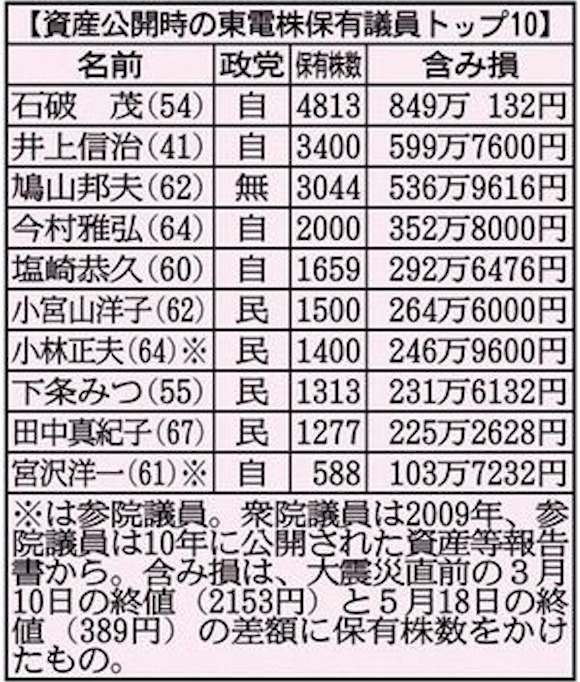
石破自身、東電の大株主三井住友の元行員。石破夫人は昭和電工取締役の娘で、東京電力と昭和電工は兄弟企業。親資本は日本15大財閥の一つの森コンツェルン。


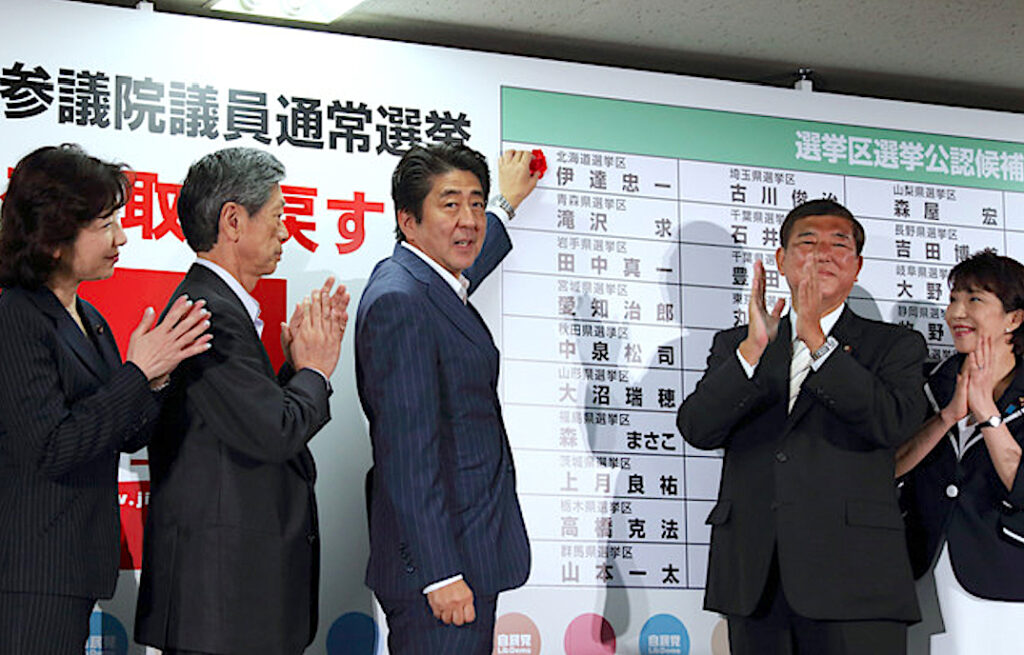
November 06, 2015
Japan abstains from U.N. vote on nuclear arms ban treaty working group
NEW YORK — Japan has abstained from a Nov. 5 United Nations General Assembly First Committee vote on a draft resolution establishing a working group to consider a worldwide nuclear weapons ban treaty.
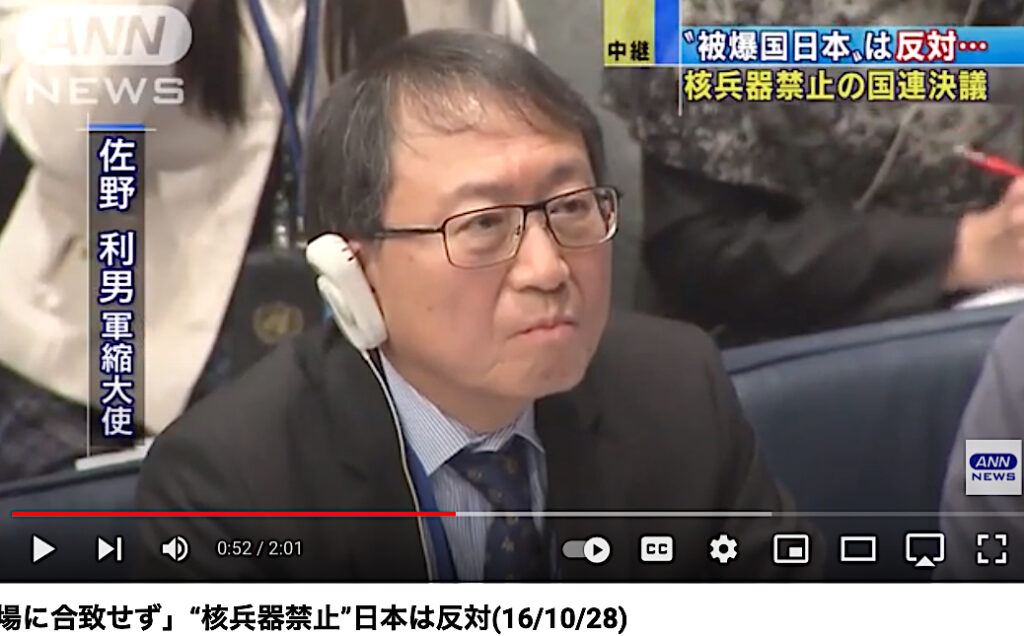
The draft resolution, “Taking forward multilateral nuclear disarmament negotiations,” was passed by a vote of 135 countries in favor to 12 opposed — including the nuclear powers of the United States, Britain, France, China and Russia — with 33 abstentions, Japan among them.
The document “reaffirms the urgency of securing substantive progress in multilateral nuclear disarmament negotiations, and to this end decides to convene an open-ended working group to substantively address concrete effective legal measures, legal provisions and norms that will need to be concluded to attain and maintain a world without nuclear weapons.”
The working group would be an auxiliary body to the U.N. General Assembly, and provide advice and information to the body.
The Japanese abstention from the resolution vote “is the result of Japan’s position that cooperation between the nuclear and non-nuclear powers is necessary for disarmament,” a U.N.-related diplomatic source told the Mainichi Shimbun. Japan had a similar reason for abstaining from a Nov. 2 First Committee vote calling on the strengthening of legal frameworks toward the abolishment of nuclear weapons on similar grounds.
Though Japan is the only country in the world to endure a nuclear attack, it is also protected by the U.S. nuclear umbrella.
Japan was a member of a working group established by the U.N. General Assembly in 2013 to draw up proposals toward multilateral nuclear disarmament negotiations. The Nov. 5 resolution, however, contained specific reference to a nuclear weapons ban treaty, setting off a direct confrontation with the five nuclear powers recognized under the Treaty on the Non-Proliferation of Nuclear Weapons, or NPT.
November 06, 2015 (Mainichi Japan)
http://mainichi.jp/english/english/newsselect/news/20151106p2a00m0na016000c.html
国連委:核廃絶へ作業部会、決議 日本は棄権
毎日新聞 2015年11月06日 東京夕刊
【ニューヨーク草野和彦】国連総会第1委員会(軍縮)は5日、核兵器禁止条約を念頭に置いた初めての作業部会設置に関する決議案を賛成多数で採択した。135カ国の賛成に対し、日本を含む33カ国が棄権。米英仏中露を含む核保有国など12カ国が反対した。
決議によると、新たな作業部会は「核兵器のない世界の実現と維持」に向け、「具体的、効果的な法的措置や法規定、規範」について「実質的に取り組む」。国連総会の補助機関として設置され、総会に勧告と報告を行う。
日本が棄権した理由について、国連外交筋は「核軍縮には核保有国と非核保有国の協力が必要という日本の立場と照らし合わせた結果」と説明した。被爆国でありながら米国の「核の傘」に守られている日本は、核廃絶への法的枠組み強化を求める決議案採決時にも、同様の理由で棄権していた。
国連総会には2013年にも、「多国間核軍縮交渉の前進に向けた提案を作り出す」ための作業部会が設置され、日本も参加した。しかし、今回の決議は核保有国が徹底的に反対しており、非核保有国との対立が先鋭化した。
http://mainichi.jp/shimen/news/20151106dde001030082000c.html
タレントのくせに! ん⁉ 何にも しない する気がない議員のくせに!
◆渡辺謙さんのメッセージ全文◆ 2016年10月28日にこれをアップ
〈核兵器禁止条約に日本が「反対」という信じられないニュースが流れました。いったいどうやってこの地球から無用な兵器を無くしていくつもりなのか? 核を持つ国に追従するだけで意見は無いのか。原爆だけでなく原発でも核の恐ろしさを体験したこの国はどこへ行こうとしているのか、何を発信したいのか〉
安倍首相は今年の広島・長崎の平和記念式典でオバマ訪問を「核兵器を使用した唯一の国の大統領が、被爆の実相に触れ、被爆者の方々の前で、核兵器のない世界を追求する、そして核を保有する国々に対して、その勇気を持とうと力強く呼びかけました」と自らの実績として大々的に大嘘アピール。
最後に渡辺謙さんの談:「確かに俳優という職業で、発言をすることに危うさは感じている。しかし社会人という意味では僕は皆さんと何も変わらない。ひとりの社会人としてこれからも臆せずに発言をしたい」と!
無気力●無関心の国民の多い中において、是非とも見習ってほしいものであります。
核セキュリティーサミット 合意文書を採択 閉幕
2016年4月2日 7時05分
核セキュリティーサミットは、過激派組織IS=イスラミックステートなどのテロ組織が核物質を入手するのを阻止するため、国際社会が協力して取り組む必要性を強調した合意文書「コミュニケ」を採択して閉幕しました。
安倍総理大臣やアメリカのオバマ大統領など、50か国余りの首脳らが参加してワシントンで開かれた核セキュリティーサミットは2日間の日程を終え、1日夕方(日本時間の2日朝早く)合意文書となるコミュニケを採択し閉幕しました。
発表されたコミュニケでは、過激派組織ISなどのテロ組織を念頭に「国家でない者が核物質などを入手するのを阻止するために取り組むとともに、核物質を使ったテロへの対策で情報の共有など国際社会が協力する必要性を強調する」としています。
核兵器のない世界を目指すオバマ大統領の呼びかけで2010年から2年ごとに開かれてきたサミットも今回が最後となり、コミュニケは「今回をもってサミットは終了するが、各国は核セキュリティーを永続的な優先課題とし続けることを決意した」とうたっています。
そして、「核セキュリティーを継続的に強化していくために行動計画を作り、実施していくことを決めた」として、各国がこれまでの成果を今後の取り組みの指針として生かしていくことで合意したとしています。
http://www3.nhk.or.jp/news/html/20160402/k10010465511000.html
米大統領が各国首脳と会合 連携して核脅威に対応を
2016年4月2日 7時56分
アメリカのオバマ大統領は、フランスやイギリス、中国などの首脳たちと会合を開き、イランの核開発問題の合意の成果を強調し、今後も連携し核の脅威に取り組む姿勢を示しました。
首都ワシントンで開かれている核セキュリティーサミットに合わせて、オバマ大統領は1日、イランの核開発問題を巡って交渉を行ったフランスのオランド大統領やイギリスのキャメロン首相、中国の習近平国家主席らと首脳会合を開きました。
この中で、オバマ大統領は「7年前、私はプラハで『核兵器のない世界』を訴えたが、最大の試練の一つがイランの核開発問題だった。そして合意によって大きな進展が見られた」と述べ、外交交渉によってイランとの合意を導いた成果を強調しました。
そのうえで、「国際社会は引き続き核の脅威にさらされているが、イランの核合意は、われわれは一致して対応できることを示している」と述べ、北朝鮮の核問題や核を使ったテロ対策などに向けて、今後も連携して取り組む姿勢を示しました。
一方、オバマ大統領は「イランの核合意によって、すべての隔たりが埋まったわけではない」と述べ、イランの弾道ミサイル開発などが地域を不安定化させているとし、引き続きミサイル開発に対する経済制裁を維持して、警戒を緩めない姿勢を強調しました。
http://www3.nhk.or.jp/news/html/20160402/k10010465531000.html
April 2, 2016 (Mainichi Japan)
Japan to give up more uranium in historic nuke material removal bid
WASHINGTON (Kyodo) — Japan said Friday it will give up more highly enriched uranium as part of what U.S. President Barack Obama hails as an unprecedented bid to tighten control over unused nuclear material.
•
Japanese Prime Minister Shinzo Abe spoke during a session of the Nuclear Security Summit of the new plan to remove highly enriched uranium from a facility in Osaka, in addition to a similar pledge made in the previous meeting of the biennial summit in 2014.
“Japan is working to complete the removal of more than half a ton of highly enriched uranium and plutonium, which is the largest project in history to remove nuclear material from a country,” said Obama, who is host of the summit.
Japan already removed 331 kilograms of plutonium and hundreds of kilograms of highly enriched uranium from the Fast Critical Assembly, a research facility located in Tokaimura, northeast of Tokyo in line with the 2014 pledge.
Japan will give up highly enriched uranium, including some at the weapon-usable level, and transport it from the Kyoto University Critical Assembly in Osaka Prefecture to the United States, in a new commitment highlighted in their joint statement released Friday.
The amount of highly enriched uranium to be removed from the Osaka facility is some 45 kilograms, according to people familiar with the project. The Japanese government does not disclose the amount of nuclear materials to be transported, citing security reasons.
The scale of Japan’s project is “hundreds of kilograms of weapon-usable material,” U.S. Energy Secretary Ernest Moniz told a joint press event with Japanese Deputy Chief Cabinet Secretary Koichi Hagiuda.
“So this process will permanently remove any risk of this material falling into the wrong hands,” Moniz said.
How to prevent terrorists from obtaining nuclear substances that could be used to make bombs is among key topics at the two-day summit through Friday in Washington involving leaders from more than 50 countries.
Japan and the United States have launched talks to create a framework to share classified information in the area of nuclear security, the statement said.
Tokyo and Washington need a fresh information-sharing scheme after a new secrecy law took effect in Japan in 2014, according to a Japanese government official.
http://mainichi.jp/english/articles/20160402/p2g/00m/0dm/002000c
Plutonium from Japan to be disposed of underground in New Mexico
April 2, 2016 (Mainichi Japan)
TOKYO (Kyodo) — U.S.-bound plutonium that has recently been shipped out of Japan will be disposed of at a nuclear-waste repository in New Mexico after being processed for “inertion” at the Savannah River Site atomic facility in South Carolina, according to an official of the National Nuclear Security Administration.
•
“The plutonium will be diluted into a less sensitive form at the SRS and then transported to the Waste Isolation Pilot Plant (WIPP) for permanent disposal deep underground,” said Ross Matzkin-Bridger in charge of the operation at the NNSA, a nuclear wing of the Department of Energy.
“The dilution process involves mixing the plutonium with inert materials that reduce the concentration of plutonium and make it practically impossible to ever purify again,” he told Kyodo News in a recent phone interview.
The official made the remarks ahead of the latest Nuclear Security Summit, sponsored by President Barack Obama, which began Thursday in Washington.
The fourth meeting of world leaders is focused on how to secure weapons-usable nuclear materials all over the globe. The summit started after Obama’s 2009 speech in Prague, in which he called for “a world without nuclear weapons” and for which he was awarded a Nobel Peace Prize later that year.
At the previous summit in the Netherlands in March 2014, Prime Minister Shinzo Abe agreed to return plutonium and highly enriched uranium upon request from the Obama administration, which is seeking to strengthen control of nuclear materials.
The removal of 331 kilograms of plutonium and hundreds of kilograms of HEU from the Fast Critical Assembly, a research facility located in Tokaimura, Ibaragi Prefecture, was completed before the Nuclear Security Summit kicked off.
Japan received the plutonium and HEU fuels from the United States, Britain and France from the late 1960s to early 1970s for research purposes in the name of “Atoms for Peace.”
The nuclear fuel delivery, however, has generated controversy in South Carolina since it was reported that it was en route to the U.S. government-run SRS facility in the state.
South Carolina is “at risk of becoming a permanent dumping ground for nuclear materials,” Gov. Nikki Haley said in a recent letter to Energy Secretary Ernest Moniz, calling for the freight to be stopped or rerouted.
The final disposal at the WIPP, as described by Matzkin-Bridger, may defuse these local concerns in South Carolina.
The WIPP is a repository — about 660 meters underground — for permanently storing nuclear waste created by the U.S. government’s nuclear weapons program.
“The Department of Energy has signed a Record of Decision to implement our preferred option to prepare 6 metric tons of surplus plutonium from the SRS for permanent disposal at the WIPP near Carlsbad, New Mexico,” Matzkin-Bridger explained. “This includes all foreign plutonium that we bring to the United States under our nonproliferation programs.”
The HEU from Japan’s FCA will be “down-blended” to low enriched uranium at the Y-12 National Security Complex in Oak Ridge, Tennessee, according to the official. In the future, LEU will be used for research purpose at research reactors both in the United States and Japan, possibly including the FCA.
“This project was accomplished on an accelerated timeline well ahead of schedule, thanks to the hard work and strong cooperation from both sides,” said a U.S.-Japan joint statement released Friday on the sidelines of the Nuclear Security Summit.
“It furthers our mutual goal of minimizing stocks of HEU and separated plutonium,” the document added, emphasizing the importance of the operation in strengthening nuclear security.
In the statement, the Japanese government made a new pledge to remove and transfer HEU fuels from the Kyoto University Critical Assembly (KUCA), another Japanese research institute, to the United States for down-blending and “permanent threat reduction.”
“If the KUCA’s HEU reactor is successfully converted to a LEU unit, it will have a significant meaning for other reactors in the U.S. and European nations, which are pursuing to convert reactors for LEU,” Hironobu Unesaki, professor at Kyoto University, said. “The KUCA could provide academic outputs for future LEU conversion process worldwide.”
Officials and specialists in both nations have praised the bilateral cooperation, which aims to reduce the threat of nuclear terrorism through securing sensitive materials.
However, the materials recently transferred from Japan are only the tip of iceberg. Currently, Japanese utilities possess over 47 metric tons of separated plutonium, which is equivalent to about 6,000 nuclear bombs.
At the last Nuclear Security Summit two years ago, Abe restated Japan’s international promise not to possess any plutonium that it has no use for. But the country’s stockpile of the nuclear material has since slightly increased.
A recent court injunction to suspend the operation of two plutonium-consuming reactors in Fukui Prefecture in Japan has made a solution for the Japanese plutonium problem more elusive.
http://mainichi.jp/english/articles/20160402/p2g/00m/0dm/003000c
“What happens if Japan, who could tomorrow, could go nuclear tomorrow? They have the capacity to do it virtually overnight.”
Vice President Joe Biden
U.S. Vice President Joe Biden has told Chinese President Xi Jinping that Japan has the capacity to acquire nuclear weapons “virtually overnight.”
06/20/2016
https://charlierose.com/videos/28262?autoplay=true

核兵器禁止条約 決議案が国連の委員会で採択 日本は反対
2016年10月28日 10時18分
国際NGO、ICAN(アイキャン)の核兵器廃絶国際キャンペーンの川崎哲国際運営委員は、今回の決議案に日本政府が反対したことについて、「驚くとともに憤りを感じている。日本は核のない世界を目指すという目標を掲げておきながら、核兵器禁止条約の交渉を拒否した。日本政府はこれまで核兵器を持つ国と持たない国の橋渡しをすると言ってきたが、今回反対したことで、完全に軸足を核保有国側に移したと言える。国内でも理解されるとは思えないし、強く抗議をしていきたい」と述べました。
また、今後の核兵器禁止条約制定を目指す交渉について、「早く交渉が進み、核兵器の禁止が国際法になるよう働きかけていきたい」としたうえで、「日本政府にも考え方を改めて、交渉に参加してもらいたい」と述べました。
また、ICANの核兵器廃絶国際キャンペーンのベアトリス・フィン事務局長は、核兵器禁止条約の制定を目指す決議案が採択されたことについて、「歴史的なことで非常にうれしく感じている。核兵器をなくすための交渉がほとんど進まなかった20年がようやく終わることになり、国連にとっても極めて重要な瞬間だったと思う。多くの国が、反対を求める核保有国からの圧力を受けながら、賛成してくれた」と述べ、意義を強調しました。
そして、「核兵器による被害を最もよく知る被爆者の声が、決議の採択に至る過程でも非常に重要だったし、今後の交渉の過程でも重要になってくる」と述べ、広島や長崎の被爆者が条約の制定に向け重要な役割を果たすという認識を示しました。
その一方で、日本政府がアメリカなどに同調して決議に反対したことについては「非常に落胆させられた」と述べ、強い失望感を示しました。
Japan’s New Leader Pushes Nuclear Weapons and Controversial ‘Asian NATO’
Published Oct 03, 2024, Newsweek
Japan’s hawkish Prime Minister Shigeru Ishiba has called for an “Asian version of NATO” to counter the rising threats of military cooperation from China, Russia, and North Korea.
Recent years have seen an uptick in bilateral defense cooperation between the U.S., Japan, and other regional partners, in what the Biden administration has dubbed “latticework” security architecture.
This has included regular talks with Japan, India, and Australia under the Quadrilateral Security Dialogue (QUAD) grouping, the AUKUS arrangement with Australia and the U.K. and increased cooperation between Washington, Tokyo, and Seoul.
In an op-ed he wrote for Washington D.C. think tank the Hudson Institute ahead of his ascension to the office, Ishiba listed these and other developments as wins. However, he went further to call for a NATO-style mutual defense framework for the region, saying this is essential for deterring China and preventing conflict, such as a war over Beijing-claimed Taiwan.
“If these alliances are upgraded, a hub-and-spoke system, with the Japan-U.S. alliance at its core, will be established; and in the future, it will be possible to develop the alliance into an Asian version of NATO,” the former defense minister wrote. He warned: “Ukraine today is Asia tomorrow.”
Ishiba went on to call for a reimagining of the U.S.’s nuclear posture amid Russia’s deepening military ties with North Korea, saying that Russia has transferred nuclear technology to North Korea.
Analysts have expressed concern that Moscow may have shared nuclear expertise with the Kim Jong Un regime in exchange for the artillery and missiles with which Pyongyang has furnished Russian forces for their ongoing invasion of Ukraine. However, no evidence of such an arrangement has been reported.
Members of Ishiba’s cabinet have not expressed the same enthusiasm for an Asian answer to NATO.
“I think it’s one idea for the future. It’s difficult to immediately set up a mechanism that would impose mutual defense obligations in Asia,” Japan’s top diplomat, Foreign Minister Takeshi Iwaya, told reporters in Tokyo Wednesday.
U.S. officials have also demurred, with Daniel Kritenbrink, assistant U.S. secretary of state for East Asia and the Pacific, saying the proposal is premature.
“It’s too early to talk about collective security in that context, and more formal institutions,” Kritenbrink said last month said at an event hosted by the Stimson Center think tank. “What we’re focused on is investing in the region’s existing formal architecture and continuing to build this network of formal and informal relationships,” he added.
China, however, has for years suggested the U.S.’s Indo-Pacific strategy, including the QUAD and AUKUS groupings, are part of a broader goal to set up a regional answer to trans-Atlantic bloc.
“The real goal for the Indo-Pacific strategy is to establish an Indo-Pacific version of NATO. These perverse actions run counter to common aspirations of the region and are doomed to fail,” Chinese Foreign Minister Wang Yi said during a 2022 press conference.
While a formal multination security alliance may not manifest anytime soon, recent Liberal Democratic Party governments have made strides toward increased security cooperation, Ishiba said.
He cited former Prime Minister Shinzo Abe reinterpreting of Japan’s postwar constitution to permit “collective self-defense” in the event that one of Tokyo’s key allies is attacked. Newly resigned Prime Minister Fumio Kishida laid plans to modernize and expand Japan’s Self-Defense Force further and set a new defense spending target of 2 percent, in line with the minimum agreed to by NATO members.
In his congratulatory call on Tuesday, Chinese President Xi Jinping told Ishiba that it is in both countries’ interests to pursue peaceful coexistence and mutually beneficial cooperation and to “strive to build a constructive and stable China-Japan relationship that meets the requirements of the new era,” according to a statement from China’s Foreign Ministry.
https://www.newsweek.com/japan-prime-minister-ishiba-pushes-nuclear-weapons-asian-nato-1963059
Sep 25, 2024 Hudson Institute
Shigeru Ishiba on Japan’s New Security Era: The Future of Japan’s Foreign Policy
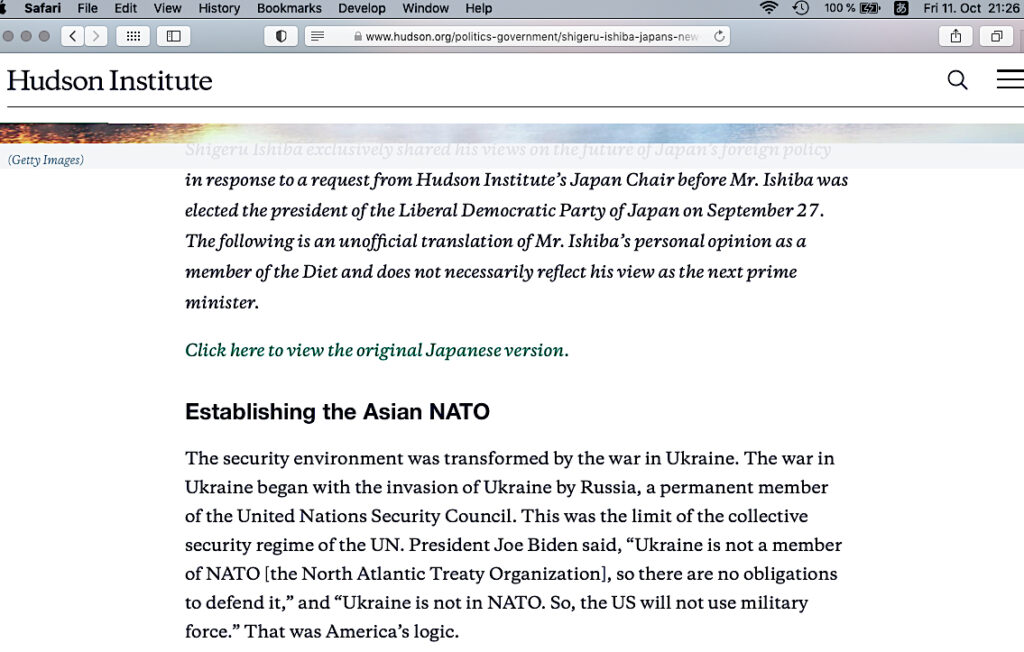
Shigeru Ishiba exclusively shared his views on the future of Japan’s foreign policy in response to a request from Hudson Institute’s Japan Chair before Mr. Ishiba was elected the president of the Liberal Democratic Party of Japan on September 27. The following is an unofficial translation of Mr. Ishiba’s personal opinion as a member of the Diet and does not necessarily reflect his view as the next prime minister.
Establishing the Asian NATO
The security environment was transformed by the war in Ukraine. The war in Ukraine began with the invasion of Ukraine by Russia, a permanent member of the United Nations Security Council. This was the limit of the collective security regime of the UN. President Joe Biden said, “Ukraine is not a member of NATO [the North Atlantic Treaty Organization], so there are no obligations to defend it,” and “Ukraine is not in NATO. So, the US will not use military force.” That was America’s logic.
Under Article 51 of the UN Charter, Ukraine has the right of all nations to “exercise the right of collective self-defense in the event of a request for assistance from an aggressor nation, pending a decision by the UN Security Council. Such a right should not have been denied to Ukraine because it is not a NATO member, but the US did not defend Ukraine under the article.
Ukraine today is Asia tomorrow. Replacing Russia with China and Ukraine with Taiwan, the absence of a collective self-defense system like NATO in Asia means that wars are likely to break out because there is no obligation for mutual defense. Under these circumstances, the creation of an Asian version of NATO is essential to deter China by its Western allies.
To this end, Japan made a cabinet decision during the Abe administration to reinterpret the Constitution to allow for the exercise of the right of collective self-defense. The Japanese Self-Defense Forces, which had been allowed to use only minimal force in response to a direct attack on Japan, could now fight back if certain conditions were met, even in the event the attack was on a country Japan has a close relationship with. Later, under the Kishida administration, the cabinet approved the “Three Security Documents” and increased the defense budget to 2 percent of gross domestic product (GDP) to ensure the ability to fight back.
Enactment of the National Security Legislation
However, these measures are merely stipulated in cabinet decisions or individual laws. In Japan, it is customary for the Diet to enact basic laws on important issues of national policy, clearly stating the direction of these laws before the people and proceeding with individual policies. However, there is no basic law on security issues to date. The geopolitical crisis surrounding our country has risen to the point where war could break out at any moment. To deal with this crisis, the enactment of the “National Security Legislation” is urgently needed. The “Basic Law on National Security” is one of the pillars of my foreign and national security policy, which has been repeatedly discussed within the LDP, and will be followed by the LDP’s long-cherished desire to revise the Constitution.
Currently, in the Indo-Pacific region, the QUAD (the United States, Japan, Australia, and India) has been raised to the level of a summit meeting, and AUKUS (Australia, the United Kingdom, and the United States) was created in September 2021. Furthermore, the security cooperation relationship between the US, Japan, and South Korea has deepened, and many frameworks, including regular summit meetings, joint training, and information sharing, have been institutionalized, bringing the bilateral alliances closer to a real “trilateral alliance.” The US and Japan have also reviewed the command and control structure of the Self-Defense Forces and US forces in Japan, put forward the joint development and production of defense equipment such as missiles, and coordinated on American extended deterrence.
Recently, Russia and North Korea have formed a military alliance, and nuclear technology is being transferred from Russia to North Korea. North Korea is strengthening its nuclear and missile capabilities, and if China’s strategic nuclear weapons are added to these dynamics, the US extended deterrence in the region will no longer function. This is to be supplemented by an Asian version of NATO, which must ensure deterrence against the nuclear alliance of China, Russia, and North Korea. The Asian version of NATO must also specifically consider America’s sharing of nuclear weapons or the introduction of nuclear weapons into the region.
Currently, in addition to the US-Japan alliance, Japan has quasi-alliance relationships with Canada, Australia, the Philippines, India, France, and the United Kingdom. Furthermore, the “2+2” meetings are taking place, and there is a horizontal development of alliances in terms of strategic partnerships. Japan and the US are deepening security cooperation with South Korea. If these alliances are upgraded, a hub-and-spoke system, with the Japan-US alliance at its core, will be established, and in the future, it will be possible to develop the alliance into an Asian version of NATO.
On the other hand, confidence-building measures (CBMs) to reduce potential “threats” will also be important. Japan was hit by the Noto Peninsula earthquake on New Year’s Day 2024. Soon, the possibility of a Nankai Trough earthquake, an earthquake directly under the Tokyo metropolitan area, and the eruption of Mt. Fuji will increase, and the establishment of a “Ministry of Disaster Management” similar to the FEMA (Federal Emergency Management Agency) in the US is an urgent priority. In Asia, the Philippines, Taiwan, and China are frequently hit by major earthquakes, floods, and tsunamis, and multinational forces are engaged in HADR (Humanitarian and Natural Disaster Response) activities to cope with such events. China has also been committed to HADR, having dispatched a naval hospital ship to RIMPAC 16. In cooperation with the United Nations Disaster Reduction and Response (UNDRR) and other organizations, HADR activities for disaster reduction in the Asia-Pacific region will be further strengthened in cooperation with an Asian version of NATO, and confidence-building measures will be developed.
Strengthening the Japan-US Alliance as Equal to the US-UK Alliance
Japan has overcome security challenges one by one for nearly 80 years since the end of World War II. As a culmination of postwar politics, the Ishiba administration aims to contribute to regional security by strengthening the Japan-US alliance as an “equal nation” on par with the US-UK alliance. By building a framework to comprehensively promote security policy, Japan should secure its independence and peace, and proactively and positively contribute to a stable international environment.
The US-Japan Security Treaty is the backbone of Japan’s postwar political history, a bilateral alliance that must evolve with the times. The Armitage-Nye Report once proposed that the “special relationship” between the US and the UK be the model for the US-Japan alliance, and that the US and Japan become “equal partners.” Now, this is possible, and we can defend the liberal order jointly, shoulder-to-shoulder with the US. The conditions are ripe to revise the Japan-US Security Treaty into a treaty between “ordinary countries.”
The current Japan-US security treaty is structured so that the US is obligated to “defend” Japan, and Japan is obligated to “provide bases” to the US. The time is ripe to change this “asymmetrical bilateral treaty.” It is possible that the Japan-US Security Treaty and Status of Forces Agreement could be revised to allow the Self-Defense Forces to be stationed in Guam to strengthen the deterrence capabilities of Japan and the US. If this happens, a status agreement for the “SDF in Guam” could be made the same as that for US forces in Japan. Furthermore, expanding the scope of joint management of US bases in Japan would also reduce the burden on US forces in Japan.
It is my mission to raise the Japan-US alliance to the level of the US-UK alliance. To achieve this, Japan must have its own military strategy and become independent in terms of security until it is willing to share its own strategy and tactics on equal terms with the US. As a conservative politician, Shigeru Ishiba will build a “security system that can protect its own nation by itself” and actively contribute to the peace and stability of the Indo-Pacific nations based on the Japan-US alliance.
日本の外交政策の将来
アジア版NATOの創設
安全保障環境はウクライナ戦争で一変した。ウクライナ戦争は国連常任理事国のロシアによるウクライナに侵攻することで始まった。これは国連という集団的安全保障体制の限界である。バイデン大統領は「ウクライナはNATO(北大西洋条約機構)に加盟していないから防衛義務を負わない」「ウクライナはNATOに入っていない。だからアメリカは軍事力行使はしない」 それがアメリカの理屈であった。
国連憲章51条により、「被攻撃国から救援要請があった場合に国連安保理の決定がなされるまでの間、集団的自衛権を行使することができる」というのは、すべての国の権利である。それはウクライナがNATO加盟国ではないからと否定されるものでないのであるが、米国はそのような行動はとらなかった。
今のウクライナは明日のアジア。ロシアを中国、ウクライナを台湾に置き換えれば、アジアにNATOのような集団的自衛体制が存在しないため、相互防衛の義務がないため戦争が勃発しやすい状態にある。この状況で中国を西側同盟国が抑止するためにはアジア版NATOの創設が不可欠である。
そのためには日本は安倍政権のときに憲法解釈の変更を行い集団的自衛権の行使を認める閣議決定をした。日本への直接的な攻撃に対して最小限の武力行使しか許されなかった自衛隊は、親密な他国が攻撃を受けた場合でも、一定の条件を満たせば反撃可能になったのである。その後、岸田政権下で「安保三文書」を閣議決定し、防衛予算を国内総生産(GDP)比2%へ増加させ反撃能力を確保した。
国家安全保障基本法の制定
しかし、これらの措置は閣議決定や個別の法律で定めているに過ぎない。日本では、国政の重要課題は、国会で基本法を制定し、その方向性を国民の前に明示し個々の政策を進めるのが通例だが、安全保障に関しては、基本法がないまま今日に至っている。我が国を取り巻く地政学的危機はいつ戦争が起こってもおかしくない状況にまで高まっている。その危機への対処のために「国家安全保障基本法」の制定が早急に不可欠となる。「国家安全保障基本法」は自民党内でも検討を重ねたものであり、私の外交・安全保障政策の柱の一つであり、続けて自民党の悲願である憲法改正を行う。
現在、インド太平洋地域において、QUAD(アメリカ、日本、オーストラリア、インド)は首脳会談レベルまで引き上げられ、2021年9月にはAUKUS(オーストラリア、イギリス、アメリカ)が創設された。さらに、また、日米韓の安保協力関係が深化し、首脳会談の定例化をはじめ、共同訓練や情報共有など多くの枠組みを制度化し、実質的な「3か国同盟」に近づいてきている。ここでは、自衛隊と在日米軍の指揮統制の見直しやミサイルなどの防衛装備品の共同開発・生産を打ち出し、米国の拡大抑止の調整もなされている。
最近では、ロシアと北朝鮮は軍事同盟を結び、ロシアから北朝鮮への核技術の移転が進んでいる。北朝鮮は核・ミサイル能力を強化し、これに中国の戦略核が加われば米国の当該地域への拡大抑止は機能しなくなっている。それを補うのはアジア版NATOであり、そこでは中国、ロシア、北朝鮮の核連合に対する抑止力を確保せねばならない。アジア版NATOにおいても米国の核シェアや核の持ち込みも具体的に検討せねばならない。
現在、日本は日米同盟の他、カナダ、オーストラリア、フィリピン、インド、フランス、イギリスと準同盟国関係にある。そこでは「2+2」も開催されるようになり戦略的パートナーシップの面として同盟の水平的展開がみられる。韓国とも日米は安全保障協力を深化させている。これらの同盟関係を格上げすれば、日米同盟を中核としたハブ・スポークスが成立し、さらにはアジア版NATOにまで将来は発展させることが可能となる。
他方、潜在的「脅威」を低減させる信頼醸成措置(CBM)も重要となる。日本は、2024年の元旦は能登半島地震が起こった。近い将来、南海トラフ地震、首都直下地震、富士山噴火の可能性が高まり、米国のFEMA(連邦緊急事態管理庁)に準ずる「防災省」の設置が喫緊の課題となっている。アジアに目を転じてみるとフィリピン、台湾、中国は大きな地震、水害、津波にたびたび見舞われ、その対処として多国籍軍によるHADR(人道及び自然災害)活動がある。中国もHADRに力を入れており海軍の病院船を「リムパック16」に派遣したこともある。国連防災機関(UNDRR)などと協力しながらアジア太平洋地域における防災に対するHADR活動をアジア版NATOと連携しながらさらに強化し、信頼醸成措置を展開させる。
米英同盟なみに日米同盟を強化する
日本は、戦後80年近くにわたり安全保障上の課題をひとつひとつ乗り越えてきた。石破政権では 戦後政治の総決算として米英同盟なみの「対等な国」として日米同盟を強化し、地域の安全保障に貢献することを目指す。安全保障政策を総合的に推進する枠組みを築くことで、日本の独立と平和を確保し、安定した国際環境の実現に主体的かつ積極的に寄与すべきと考える。
日米安全保障条約は、日本の戦後政治史の骨格であり、二国間同盟であり時代とともに進化せねばならない。アーミテージ・ナイ・レポートはかつて米英同盟の「特別な関係」を同盟のモデルとして、日米は「対等なパートナー」となることを提案した。今、それが可能となり、米国と肩をならべて自由主義陣営の共同防衛ができる状況となり、日米安全保障条約を「普通の国」同士の条約に改定する条件は整った。
アメリカは日本「防衛」の義務を負い、日本はアメリカに「基地提供」の義務を負うのが現在の日米安全保障条約の仕組みとなっているが、この「非対称双務条約」を改める時は熟した。日米安全保障条約と地位協定の改定を行い自衛隊をグアムに駐留させ日米の抑止力強化を目指すことも考えられる。そうなれば、「在グアム自衛隊」の地位協定を在日米軍のものと同じものにすることも考えられる。さらに、在日米軍基地の共同管理の幅をひろげていくなどすれば在日米軍の負担軽減ともなろう。
米英同盟なみに日米同盟を引き上げることが私の使命である。そのためには日本は独自の軍事戦略を持ち、米国と対等に戦略と戦術を自らの意思で共有できるまで、安全保障面での独立が必要である。保守政治家である石破茂は、「自分の国家は自分で守れる安全保障体制」の構築を行い、日米同盟を基軸としてインド太平洋諸国の平和と安定に積極的に貢献する。
Russia has threatened to use nuclear arms since it began its invasion of Ukraine in February 2022, while fears have intensified amid mounting confrontation between Israel, a nuclear state, and Iran, which has been working on developing such a weapons capability.
more @
Japan’s nuke-bomb survivors group wins Nobel Peace Prize
October 11, 2024
https://mainichi.jp/english/articles/20241011/p2g/00m/0in/055000c

